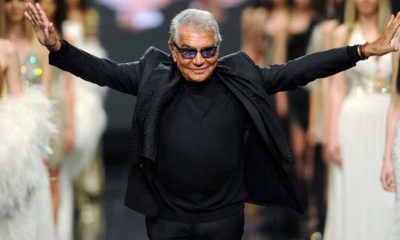Aside from the inverted skyline, the only giveaway that something is off in one of the most striking images of “Spider-Man: Across the Spider-Verse” is the ponytail that’s sticking straight up in the air.
Gwen Stacy (voiced by Hailee Steinfeld) and Miles Morales (Shameik Moore) have just reunited in the “Into the Spider-Verse” sequel. After giddily swinging through New York skyscrapers, they perch themselves on the underside of a clocktower ledge. Their view is ours: An upside-down city, shimmering in the distance.
“Everything is the wrong way, but if feels right,” says Phil Lord, who wrote and produced “Across the Spider-Verse” with Christopher Miller.
In the movies of Lord and Miller, a filmmaking duo since they met in college at Dartmouth, down is frequently up, and up is often down. They’ve turned seemingly terrible ideas — a Lego movie, a “21 Jump Street” movie — into original works of antic, innovative comedy. One of their crowning achievements, the Oscar-winning “Into the Spider-Verse,” took a hatchet to superhero movie conventions. Spider-Man, for the first time, was a biracial kid from Brooklyn. He was also, thanks to a mosh pit of multiverses, just about anyone, or anything, you could think of.
“With that mask that covers an entire body and face, you can imagine yourself in that suit,” says Miller. “The whole goal of this trilogy was to let everybody feel like it could be me, and show as many different types of people — and animals — being Spider-Man as possible.”
It took nearly five years, a crew of a thousand and a cavalcade of Spider-People, but the second chapter of Miller and Lord’s “Spider-Verse” series has arrived. It might be their masterpiece. In “Across the Spider-Verse” — an eyeball-delighting, electrically animated whirligig of color and sound — Lord and Miller set out not just to surpass the high bar of their 2018 original but upend big-studio animation and the more-of-the-same expectations of sequel-making.
“It was an opportunity to show the limitless possibilities of animation in a studio film,” says Miller. “For too long, the studios were mandating that these films all look the same. And we wanted to blow the doors open on that.”
“Across the Spider-Verse” certainly blasted expectations on opening weekend. It debuted with $120.5 million, way above tracking estimates and more than triple what “Into the Spider-Verse” launched with. What was once a quirky minor player in the hulking world of superhero movies has turned into not just a blockbuster but a genuine pop-culture sensation and, maybe, a new high point in comic-book movies.
“When you have the confidence of the audience like I hope we have from the first movie, you sort of want to use it as a springboard to take more chances,” says Lord. “We couldn’t justify doing this with any other story or any other point in our careers. We were like: Let’s swing the biggest bat we can.”
“Across the Spider-Verse,” directed by Joaquim Dos Santos, Kemp Powers and Justin K. Thompson, continues the story of Miles, now a veteran crime-fighter but also a teenager with an increasingly strained relationship with his parents. They remain unaware of his secret identity.
But much isn’t straightforward in “Across the Spider-Verse,” which Lord and Miller penned with David Callaham. There are countless other parallel Earths, each with their own Spider-Person. One is Gwen (Hailee Steinfeld), Spider-Man’s traditional love interest who’s now a potent force, herself. Worlds collide, many times over.
There’s also a Spidey collective that keep these universes in balance by making sure certain canonical moments happen for each hero. There may be wide latitude in who can be Spider-Man, but a foundation of formula must be obeyed.
This battle with Canon is in many ways Lord and Miller’s fight, too. They’ve spent their careers deconstructing convention and inverting tropes. They have sometimes pushed right up against Hollywood’s limits. In mid-production on “Solo,” the Han Solo standalone “Star Wars” film, they were famously replaced after a clash over the film’s tone.
“Across the Spider-Verse,” a part two ending in an abrupt cliffhanger, plunges directly into the question: So what is gospel for Lord and Miller? Is anything?
“Who seeks to become an artist in order to be a column that upholds the temple?” says Lord, laughing. “That’s no fun.”
The “Solo” kerfuffle might have been their “Network” moment. (“You have meddled with the primal forces of nature, Mr. Beale.”) Instead, Lord and Miller have, if anything, doubled down on their devotion to tearing up Hollywood playbooks.
“We have a natural aversion to the dangers of nostalgia. It can be a calcifying effect on people,” says Miller. “There’s a lot of anger and hate coming out of wanting to preserve things the way they’ve always been. That’s not how society works. We need to keep evolving and making things new and growing. We can’t just perfectly preserve the past.”
“The movies you love were all daring in their time,” adds Lord. “The idea isn’t to copy them. It’s to be as equally daring as ‘Snow White’ or ‘Toy Story’ or ‘Jaws.’”
Their collage-like films, like Michael Rianda’s family road trip “The Mitchells vs. The Machines,” are often in some way contemplating humanity in increasingly digital worlds. Lord and Miller were behind the meme-turned-movie “Cocaine Bear” earlier this year.
Set to a modern hip-hop beat and chock-full of ever-changing shocks of color that channel the 2-D art of comic books, “Across the Spider-Verse” summons multiverses with the ease of a keystroke. But it does so far more playfully, disorderly and distinctly un-algorithm-like. Striving for originality, they say, is “how to keep the robots guessing.”
“The AI isn’t going to generate something new and original,” says Miller, who along with Lord, is an outspoken Writers Guild member in the current strike where artificial intelligence is a top issue. “It’s going to just do an imitation of the things that came before it. It’s our job as humans to keep making things new.”
But as dizzying as “Across the Spider-Verse” can be visually, the imagery is ultimately in service of its central characters’ inner lives. To the 28-year-old Moore, Miles’ appeal isn’t that he’s exceptional. It’s that he’s recognizably ordinary.
“There are young Black kids that are just like Miles. Regular, cool, kinda nerdy, weird, loveable kids. Same thing on the Hispanic side,” says Moore. “People want to meet him. My lines at Comic-Con are insane.”
Moore never received a script for either film, just a sense of major plot points. Three times a month, for four years, he would go into a recording booth for six-hour sessions with Lord, Miller and the directors.
“They’ll play with it for hours. We’ll do another session where they lock in on whatever they like the most and then they’ll play with it again. It’s really like they’re having fun, more than anything,” says Moore. “The whole project is being treated like a passion project. It doesn’t feel like someone is watching over them.”
At the same time, “Across the Spider-Verse” grapples with not just the responsibilities of Spider-Man (Miles) but of his anxious, doubting parents (Brian Tyree Henry and Luna Lauren Vélez) and Gwen’s disapproving father (Shea Whigham). It’s a coming-of age-story, but as Miller says, “the parents have to come of age, too.”
“And what makes someone legitimate?” says Lord. “Do you seek that outside of yourself? Or can you simply seek your own approval? Miles is like all of us hoping for validation outside. But it can never really satisfy you. You have to take it on yourself. Even though the movie ends in a cliffhanger, I think that’s what he achieves. It’s an epic action movie where the story is really internal. He’s the MacGuffin.”
Some of the same questions exist for Lord and Miller, both 47 and increasingly prominent power players with a long pipeline of projects in development. Later this summer they have the R-rated dog comedy “Strays” in theaters. Even a live-action movie for Miles is in the mix.
“You always feel like an outsider even if you’re working inside these big companies,” says Miller. “Otherwise, you become the Empire.”
“Beyond the Spider-Verse,” the third film in the trilogy is due out in less than a year, on March 29. It will bring to a conclusion Miles’ looming battle with Spider-Man Canon. Just how far Miles — and Lord and Miller — are able to stretch the Marvel webslinger will be put to a final test.
Given who’s behind these films, don’t put a lot of money on Canon emerging victorious.
Post Views: 108


 Fashion3 months ago
Fashion3 months ago
 Fashion3 months ago
Fashion3 months ago
 Sports2 months ago
Sports2 months ago
 Sports2 months ago
Sports2 months ago
 Fashion2 months ago
Fashion2 months ago
 pakistan2 months ago
pakistan2 months ago
 World3 months ago
World3 months ago



















